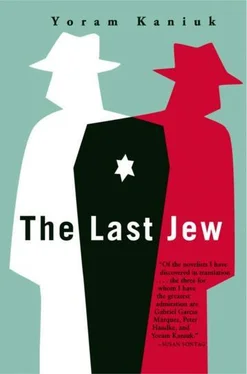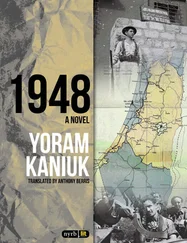A basket of apples, flowers, cheese, biscuits, cookies, and crackers stood in the middle of the table. He picked up an apple and bit into it. The beauty put some notes on a big nightstand, opened the closed drapes, and he saw the lights of Tel Aviv. Sam said to the beauty: You're wasted in this temple, and she smiled a professional and polished smile. Then a person phoned and said he was the manager of the theater and was waiting for him at the airport, and he had just heard he had come and he was sorry, but he hadn't been home for five evenings when he had waited for Sam at the airport. Sam apologized; fatigue was leaking out of him in drops of sweat, and they arranged to meet the next day. The beauty checked the bathroom, Sam paid the boy who brought the valise and he wanted to pay her too, but the two of them looked at one another, didn't say a word and he said, Sorry, thrust the money into his pocket, and said: Thanks. She said: If you want anything call me and everything will be taken care of immedi ately. He told her: Everything's confused, something's messed up there, and he pointed toward the seashore where Ebenezer and Fanya R. were strolling slowly. Everything became shadows, his body shook, and she waited, something of the pain that filled him infected her. He offered her a cigarette she lit herself because his hands were shaking too much to light it for her, and she smoked the long cigarette he had apparently bought on the plane before he fell asleep. The room smelled of flowers, aftershave, and apples, and he asked her to sit down and she sat down and dragged on the cigarette and he asked why she was so beautiful, and she said with a modest smile that she had been a beauty queen, and he said That's it, how is it to be a beauty queen? And she said, You see, you work in the Hilton, and he smiled, but something in him didn't smile, wanted to flee, but he was stuck to himself and since he couldn't do anything, his hands waved, his face was pale, and then the beauty recalled that he had to record his personal details and she took a form out of her jacket pocket, and he recorded the details and said I should have filled out the details in Lebensborn, too, and she asked what was Lebensborn, and he told her: A hotel to improve racially pure kingdoms, and he filled out the form, and she took it from his hands and glanced at it, and asked the meaning of the word Gottglaubig he had written next to the word nationality, and he muttered to himself more than to her: One who has a real German faith, and she said, You must be drunk, no? And he said, I drank all the way, did you ever host Heinrich Kramer here, and she said she didn't know, but she could find out, and he said: Never mind, never mind, and then she stood up hesitantly, waited, put out the cigarette in the ashtray, and apologized, it was clear from her face how sorry she was that the crushed cigarette dirtied the polished ashtray, but he smiled at her and she wiggled out, beautiful, and he lay down in bed, looked at the ceiling, time passed, he didn't know how much, an hour, two, five, he munched on the apples, ate cookies, and thought which side does a fish piss on. Then he went to the bathroom and saw toilet paper and thought: That's Jewish toilet paper, and he was proud. Then he wanted to laugh at his pride, but his face muscles were impermeable to his will and not far from him, a plane flew low over Ebenezer's house and landed at the little airport near the big chimney, which he didn't yet know was Reading Chimney, and he said: I've got to be objective, think objectively, formulate, maybe there's also objective faith, objective theater, objective pain and disgrace, and thus he fell asleep for a little while and awoke and called the public relations department and was told that the beauty had gone home and would come back later to a reception for the ambassador of Peru.
Time flowed somehow. He fell asleep, and when he woke up, he felt as if his body were crumbling, he turned on the radio and tried to watch it as if it were television, but the radio had no screen and he closed the curtain, lay down, sweated, and dreamed he was watering a tree and the tree refused to drink the water. Maybe he really did order the boy because he came in wheeling a cart with a pot of coffee and cookies, and what was clear was that he said: The ambassador of Peru is staying in the end suite, and then he told him: My name's Samuel Lipker, and the boy said, Fine, sir, and slammed the door behind him as if it were made of thin glass.
Then he apparently ordered more food because with his own eyes he saw him gorging himself in the mirror and a girl who wasn't young, but not yet a woman, picked up the dishes and went off, leaving him a toothpick and an intoxicating smell of orange piss. The radio was on and he now understood some of the words, and once again a cold sweat started creeping on his back. He decided to take a shower or perhaps he took a shower because he had nothing else to do. The water flowing felt nice on his body that was strange to him. In the shower he smoked a cigarette under the stream of water, and so he also started longing for Melissa and Licinda and the beauty queen. Apparently more time passed because when he picked up the phone he was already dressed and combed. They replied that the beauty had come, but wasn't in her office, and who wants to know. He locked them in the phone and locked his feet in his shoes and went out to the small balcony and looked at the sea. When he went out to the corridor, he saw a woman bent over the carpet plucking up grains of dust. The sight was depressing. He pressed the button for the elevator and waited. Downstairs he searched for the beauty. Then he thought maybe he should search for the ambassador of Peru, but he didn't feel like asking. He felt pressure in his chest and sensed an incomprehensible need to look in the various mirrors and identify himself. He broke into a locked room with a skill he hadn't used in a long time, and there was the beauty queen. She wore fabulous clothes, her soft thin hands gleamed in the light of the big chandelier and her bright eyes were more violet than green or blue. Her hair was fair but without a clear tone, as if it were made of cardboard. She was also laughing, apparently at the ambassador of Peru. The ambassador was signing his name in the guest book after Sam Lipp's name, and he thought: She screws everybody, and went outside angrily. The sight of the charming beauty queen with the ambassador of Peru offended him. Outside he lit a cigarette.
Apparently he passed by the park because on the other side were rusted houses. He thought of a concept he didn't understand at all, he thought of a trigonometry of smell, something that reminded him of articles apparently written about his play. The city was full of one-way streets that became more and more familiar, burst out, and then disappeared. Even the boardwalk square was familiar to him, and he said: "Here's the square," as if he understood. An American girl with prominent nipples in her shirt passed by him and left a fragrant trail of white blood, he tried to see her from behind, but he didn't turn his face and so he lost her. He thought of the beauty kissing the bald head of the ambassador of Peru. Trees swayed in the wind and a precisely shaped cypress sharpened its crest to the sky. There were also stars, and he was glad about them. Beyond the window of a cafe, people sat and drank. He watched them and said to himself: Here's mother, here's mother, here's Aunt Leah, here's Lipkele. Here's Uncle Yom, here's Yashka, here's the Ukrainian. Maybe they sat naked in the cafe and policemen whipped them, but they smiled even though they had no teeth. He was terrified, but didn't do a thing about it. The manager of the cafe sat outside and read a score of "Making Whoopee." He thought, this is how they made a lady of jazz. And he thought about what Charlie Parker told him when he was hanging around New York searching for a celebration of authentic and well-woven social slime. The dead sat and acted his family for him. He wanted to break the window, and so he hurried on his way. Farther down was a boulevard, jazz and dead uncles, he thought, soda with straws, I'm walking in zigzags. Cafes full of sleepy young people, thinking thoughts. A girl wanted him to sign a petition against some occupation, he signed, in Hebrew, Samuel Lipker. He bought Le Figaro in a newspaper shop, because you could buy papers from all over the world there. It excited him that in a place of dead people you could buy newspapers in foreign languages and a little girl he had to notice could lick ice cream with a heartrending sweetness.
Читать дальше












